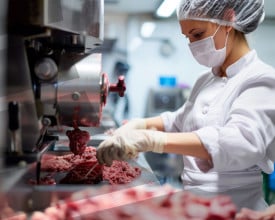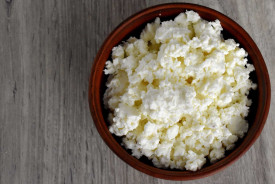 With the general controlled chaos of getting yourself and your loved ones out of the door on time each morning, it can be quite easy to forget or forgo breakfast. Even if you do remember, there is also an overabundance of unhealthy ways to start the day, too. It turns out that a balanced breakfast including sources of lean protein not only provide fuel for the day, but they also affect your diet throughout the day.
With the general controlled chaos of getting yourself and your loved ones out of the door on time each morning, it can be quite easy to forget or forgo breakfast. Even if you do remember, there is also an overabundance of unhealthy ways to start the day, too. It turns out that a balanced breakfast including sources of lean protein not only provide fuel for the day, but they also affect your diet throughout the day.
According to the Harvard School of Public Health, protein has become much more of a focus in consumers' minds thanks to the popularity of high-protein diets: "Until recently, protein got little attention. Like a quiet child in a classroom of rowdies, it was often overshadowed by fat, carbohydrates, and vitamins." Protein has been pushed into the limelight, as an essential part of the diet that can assist in weight loss, heart health, and muscle building.
Donald Layman, Ph.D., professor emeritus of nutrition at the University of Illinois at Urbana-Champaign explains that ingesting 30 grams of protein triggers protein synthesis and muscle growth. The intake of protein at breakfast, for example, could help fuel you and your muscles throughout the morning and make you feel full longer.
Before you bacon wrap that sausage link, it is important to remember that a variety of proteins exist out there, including protein sources that may be high in fat or calories. Katherine Zeratsky, R.D., L.D., writing for the Mayo Clinic, states: "foods such as red meat and full-fat dairy products" could "increase your risk of heart disease."
 So, seeking out lean proteins is a key concern. A breakfast featuring foods like low-fat dairy products (including milk and yogurt), lean meat, and/or plant proteins are heart-healthy ways to stave off hunger and resist midmorning snacking.
So, seeking out lean proteins is a key concern. A breakfast featuring foods like low-fat dairy products (including milk and yogurt), lean meat, and/or plant proteins are heart-healthy ways to stave off hunger and resist midmorning snacking.
It is important to talk with your doctor regarding any dietary concerns. Research on nutrition concerns like protein is also ongoing. Check out any of the links above to learn more about the role of protein in the diet and the potential benefits and risks associated with it.





